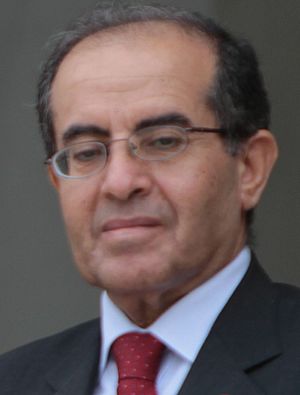Mahmoud Jibril facts for kids
Quick facts for kids
Mahmoud Jibril
محمود جبريل |
|
|---|---|

Jibril in 2011
|
|
| Prime Minister of Libya | |
| In office 5 March 2011 – 23 October 2011 |
|
| President | Mustafa Abdul Jalil |
| Deputy | Ali Abd-al-Aziz al-Isawi Ali Tarhouni |
| Preceded by | Baghdadi Mahmudi |
| Succeeded by | Ali Tarhouni (Acting) |
| Minister of Foreign Affairs | |
| In office 5 March 2011 – 22 November 2011 |
|
| Prime Minister | Ali Tarhouni (Acting) Abdurrahim El-Keib |
| Preceded by | Abdul Ati al-Obeidi |
| Succeeded by | Ashour Bin Khayal |
| Leader of the National Forces Alliance | |
| In office 14 March 2012 – 5 April 2020 |
|
| Preceded by | Position established |
| Succeeded by | TBD |
| Personal details | |
| Born |
Mahmoud Jibril el-Warfally
28 May 1952 Benghazi, Libya |
| Died | 5 April 2020 (aged 67) Cairo, Egypt |
| Cause of death | COVID-19 |
| Political party | National Forces Alliance |
| Alma mater | Cairo University University of Pittsburgh |
Mahmoud Jibril el-Warfally (born May 28, 1952 – died April 5, 2020) was an important politician from Libya. He was known by several names, including Jabril, Jebril, or Gebril.
Jibril served as the temporary Prime Minister of Libya for about seven and a half months. This was during a big change in Libya when Muammar Gaddafi's government was overthrown in 2011. He led the executive board of the National Transitional Council (NTC) from March 5 to October 23, 2011. He also handled international affairs for the NTC.
Many countries, like France, Turkey, the United Kingdom, and the United States, recognized Jibril's government as the official representative of Libya. Later, Jibril became the leader of the National Forces Alliance, which was one of the biggest political groups in Libya.
Contents
Early Life and Education
Mahmoud Jibril studied at Cairo University and earned a degree in Economics and Political Science in 1975. He then continued his studies at the University of Pittsburgh in the United States. There, he received a master's degree in political science in 1980 and a doctorate (PhD) in political science in 1985.
After his studies, Jibril became involved in organizing training programs for leaders in Arab countries. He helped manage training for senior officials in places like Egypt, Jordan, Kuwait, and Saudi Arabia.
From 2007 to early 2011, Jibril worked for the government of Muammar al-Gaddafi. He was in charge of Libya's National Planning Council and the National Economic Development Board. During this time, he supported ideas that would make Libya's economy more open.
Leading the National Transitional Council
In March 2011, during the Libyan Civil War, the National Transitional Council (NTC) formed a temporary government. Mahmoud Jibril was chosen to lead it.
As the head of the NTC, Jibril met with important world leaders. He talked with French President Nicolas Sarkozy, which led to France officially recognizing the NTC as the true voice of the Libyan people. He also met with officials from the UK and the US, convincing them to support the NTC.
People often called Jibril the "interim prime minister" or the "chairman of the Executive Board." His role was very important as the NTC's top diplomat, meaning he handled foreign relations.
In August 2011, the NTC decided to change its executive board. Jibril was asked to form a new one, but he was told to spend more time in Libya.
During the Battle of Tripoli in August 2011, Jibril gave a televised speech. He asked revolutionary fighters not to loot or hurt prisoners. He also called for unity and asked police and army members in Tripoli to join the new government. Jibril said that all Libyans could now help build a new future for their country.
Why Did He Resign?
On October 3, 2011, Jibril announced that he would step down from his role once Libya was "liberated." He meant once the city of Sirte was captured from Gaddafi's supporters.
On October 20, 2011, Sirte was captured, and Muammar al-Gaddafi was killed. Keeping his promise, Jibril resigned three days later. Abdurrahim El-Keib took over his position on October 31.
After His Time as Prime Minister
In 2012, Jibril became a member of a new political group called the National Forces Alliance. On March 14, 2012, he was chosen as the leader of this alliance.
Jibril's party, the National Forces Alliance, won the most seats in the national elections on September 7, 2012. Jibril himself tried to become prime minister again. He won the first round of voting, but in the second round, he was defeated by Mustafa Abushagur.
His Passing
On March 21, 2020, Mahmoud Jibril had a heart problem and was taken to a hospital in Cairo, Egypt. Three days later, he tested positive for COVID-19. He sadly passed away from the virus on April 5, 2020, at the age of 67.
See also
 In Spanish: Mahmoud Jabril para niños
In Spanish: Mahmoud Jabril para niños
 | Sharif Bey |
 | Hale Woodruff |
 | Richmond Barthé |
 | Purvis Young |

